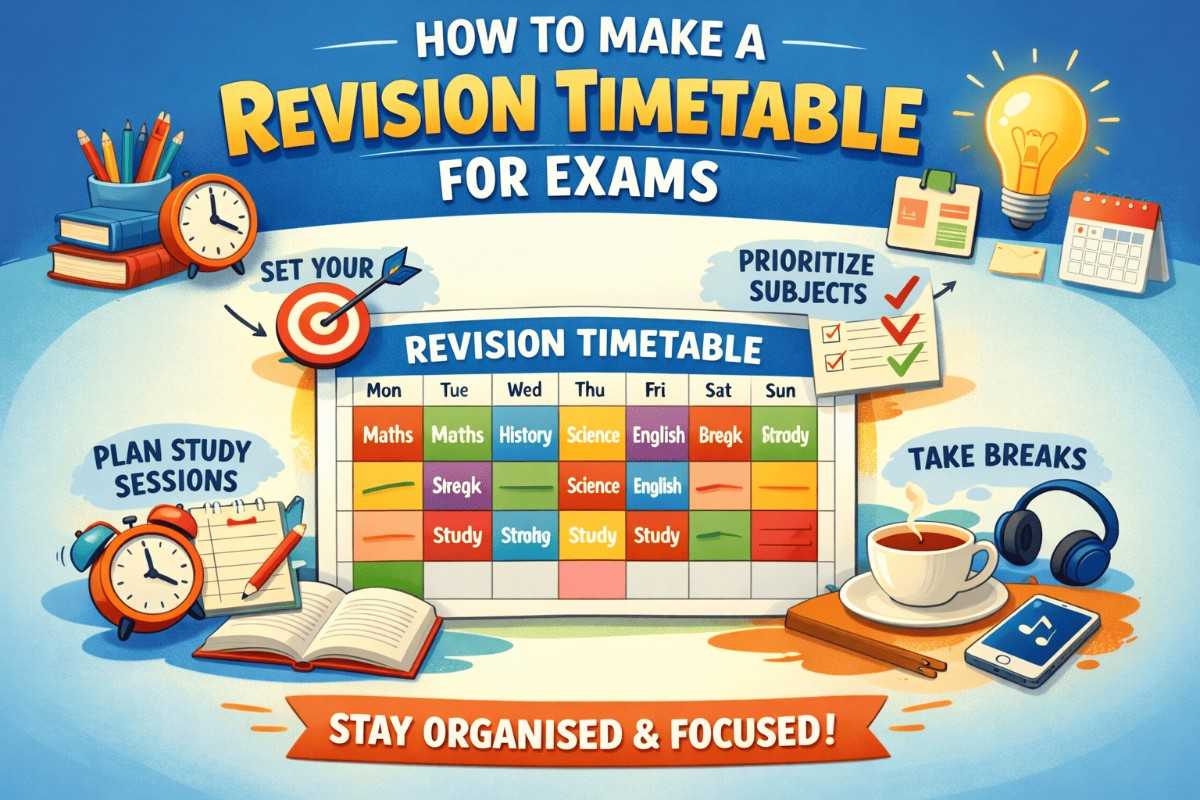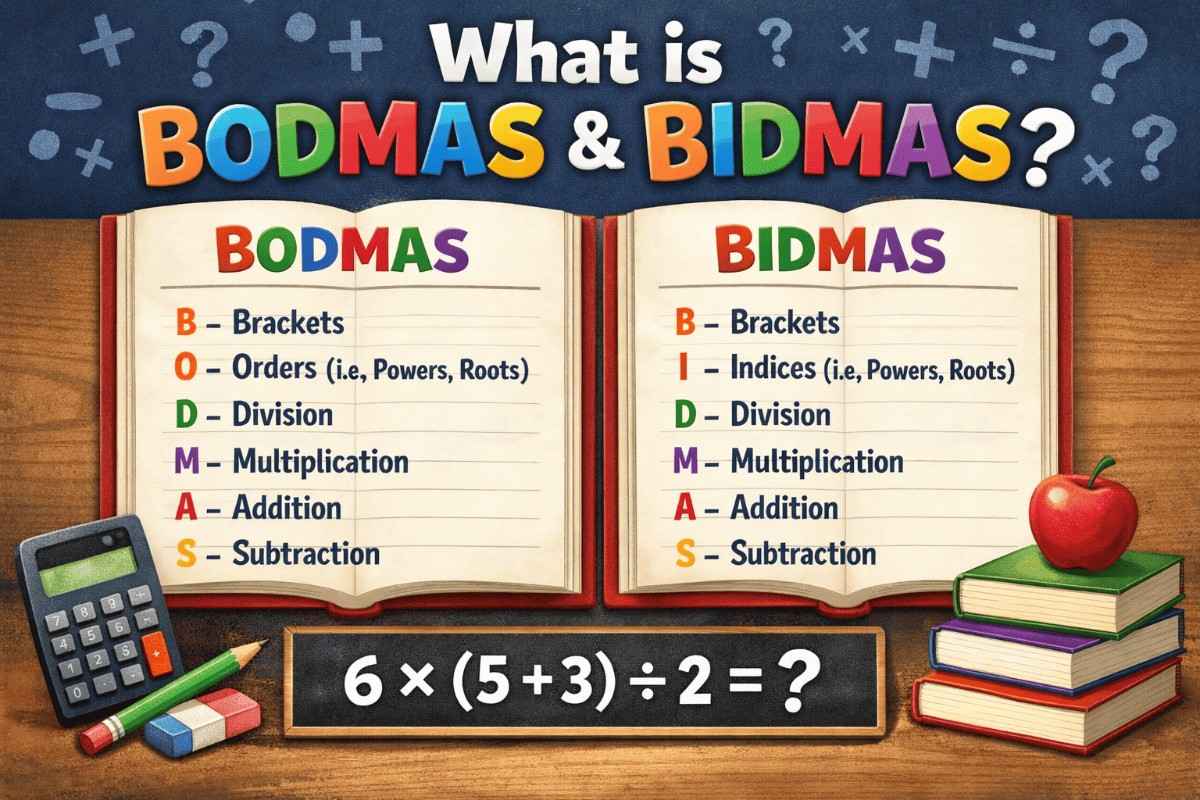
Are you searching for simple tips to help you succeed in your maths exams? You’re in the right place. Maths can feel tough, but with the right approach and a few handy strategies, you can boost your confidence and improve your results.
Whether you’re studying for GCSEs, A-levels, or any other maths test, this guide will share five easy-to-follow tips to help you prepare effectively and perform at your best.
Let’s explore how you can make maths easier.
Best Tips for Success in Maths Exams
Succeeding in maths exams is not just about being good at numbers; it’s about how you prepare and approach your study and exam day. Here are some of the best tips to help you achieve success in your maths exams:
|
Sr. No |
Tip |
Benefits |
|
1 |
Know Your Exam and Syllabus |
Focus on the right topics and question types |
|
2 |
Make a Study Plan and Follow It |
Organised revision, better memory, less stress |
|
3 |
Practise Actively and Check Work |
Builds skills, reduces errors, improves speed |
|
4 |
Strengthen Your Basics |
Makes complex problems easier and faster to solve |
|
5 |
Stay Positive on Exam Day |
Enhances focus, reduces anxiety, improves performance |
1. Know Your Exam and Syllabus
Before you start studying for your maths exam, it’s very important to understand exactly how what exam will be structured. This will help you focus your revision on the right areas and use your time wisely.
Points to remember before your exam:
- Get your syllabus from your school or the exam board website. This lists all the topics you need to learn.
- Check the exam format:
- Are there multiple-choice questions?
- Short answer questions?
- Longer problem-solving questions?
- Look at past exam papers to:
- Understand common question types
- See how hard the questions usually are
- Practice answering real exam questions
- Review marking schemes to learn how marks are awarded and what examiners look for.
- Find out which topics carry more marks so you can spend more time revising them.
- Note any changes or updates to the syllabus each year to avoid studying outdated material.
2. Make a Study Plan and Follow It
Creating a study plan helps you organise your revision over weeks or months, making it more manageable and effective. Instead of rushing at the last minute, you study small things, which improves your understanding and memory.
Follow the tips below for practice:
- Break the syllabus into small, clear topics or units.
- Use a calendar or planner to create a timetable.
- Allocate specific time slots for each topic and include practice sessions.
- Set simple, achievable daily or weekly goals (e.g., complete 10 questions or finish one topic per week).
- Allow extra time for topics you find difficult.
This organised approach helps reduce exam stress and builds confidence.
3. Practice Actively and Check Your Work
Maths requires active practice to master calculations. Simply reading notes or watching videos is not enough to be ready for exam questions.
- Solve a wide variety of maths problems regularly.
- Use past exam papers to get familiar with question types and timing.
- Write out every step clearly to show your working.
- Always check your answers using official mark schemes.
- Identify mistakes and understand where you went wrong.
- Revisit difficult questions and solve them again until you are confident.
- Practise under timed conditions to improve exam speed.
By practising actively and checking your answers, you develop problem-solving skills, reduce careless errors, and gain confidence to tackle your exam successfully.
4. Strengthen Your Basics
A strong foundation in basic maths topics is important for doing well in exams. Focus on understanding the core concepts clearly.
- Revise essential topics such as algebra, geometry, number operations, and data handling.
- Memorise important formulas but also understand their meaning and when to use them.
- Break down complex problems into smaller, easier steps.
- Draw diagrams or sketches to help visualise questions.
- Always double-check your answers to catch mistakes.
- Ask teachers, friends, or use online resources if you find any topic difficult.
- Practising basics regularly makes advanced questions easier and quicker to solve.
5. Stay Positive on Exam Day
How you prepare on the exam day affects your performance. Taking care of your physical health and mind helps you stay focused.
- Get a full night’s sleep before the exam.
- Eat a nutritious breakfast to keep your energy steady.
- Pack all required equipment: pens, a calculator, a ruler, formula sheet.
- Arrive at the exam centre early to settle in calmly.
- Read each question carefully before answering.
- Start with questions you find easiest to build confidence.
- Manage your time; don’t spend too long on one question.
- If stuck, move on and come back later if possible.
- Stay calm, breathe deeply, and believe in yourself.
- Remember that your preparation will pay off.
Following these practical steps will help keep you focused and confident when it matters most.
Every parent wants their child to do well in GCSE Maths. MathsAlpha offers expert tutoring for students from Year 7 to Year 11 across the UK. Our personalised lessons help students gain confidence and perform better in exams.
Get in touch today to book maths tutoring and give your child the support they need to succeed. To start, email us at info@mathsalpha.com or call +44 7834 229046. Together, we can make maths easier and exams more manageable!
Frequently Asked Questions
Recent Blogs
-
 15 Jan 2026
15 Jan 2026How Much Does a Maths Tutor Cost?
-
 14 Jan 2026
14 Jan 2026How to Make a Revision Timetable for Exams
-
 08 Jan 2026
08 Jan 2026What Is BODMAS and BIDMAS?
-
 03 Jan 2026
03 Jan 2026How to Calculate Probability for GCSE Maths
-

-
 04 Dec 2025
04 Dec 2025A-Level Maths Questions Students and Parents Ask
-
 18 Nov 2025
18 Nov 2025Why Do Kids Struggle with Geometry?
-
 14 Nov 2025
14 Nov 2025Who Invented Zero and How It Changed Maths
-
 11 Nov 2025
11 Nov 2025What Is A Prime Number?
-

-
 03 Oct 2025
03 Oct 2025How to Get an A* in A Level Maths
-

-
 16 Sep 2025
16 Sep 2025How Maths Is Used in Everyday Life - 11 Examples
-
 09 Sep 2025
09 Sep 2025GCSE Maths Guide for Parents and Students
-
 05 Sep 2025
05 Sep 2025What is the Year 9 Maths Curriculum?
-
 04 Sep 2025
04 Sep 2025Algebra Guide for Parents to Support Children
-
 01 Sep 2025
01 Sep 2025A Level Maths Topics and Exam Success Guide
-
 23 Aug 2025
23 Aug 2025What is Covered in Year 7 Maths Curriculum?
-
 19 Aug 2025
19 Aug 2025Difference Between GCSE Maths and A Level Maths
-
 12 Aug 2025
12 Aug 2025How to Choose the Right Maths Tutor in the UK?










